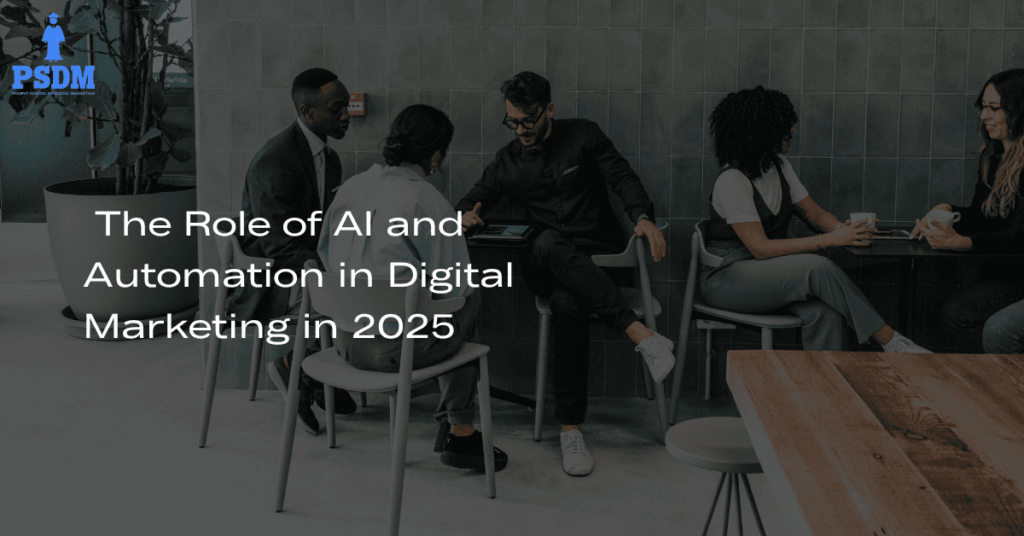Digital marketing is evolving at a rapid pace, and the year 2025 promises to be a turning point. The Role of AI and Automation in digital marketing with advancements in artificial intelligence (AI) and automation, businesses are finding innovative ways to engage audiences, optimize campaigns, and achieve unprecedented results. This blog explores how AI and automation are shaping digital marketing, highlighting key trends, challenges, and opportunities.

The Growing Influence of AI in Digital Marketing
Personalized Customer Experiences
AI enables businesses to deliver highly personalized experiences. By analyzing vast amounts of data, AI can predict user preferences, tailor content, and recommend products. For example, e-commerce platforms use AI-driven algorithms to suggest items based on browsing history and purchase patterns.
Moreover, AI-powered chatbots enhance customer interactions by providing instant support and personalized responses.Consequently, companies are able to forge closer bonds with their clientele.
Enhanced Content Creation and Curation
Content remains the backbone of digital marketing, and AI is revolutionizing how it is created and distributed. Tools like GPT models can generate high-quality content in seconds, from blog posts to social media captions. Additionally, AI helps marketers identify trending topics and keywords, ensuring content resonates with the target audience.
Automation tools streamline content scheduling and distribution, saving time and ensuring consistency across platforms. For instance, AI tools analyze engagement metrics to determine the best times to post, maximizing reach and impact.
Automation in Campaign Management
Streamlined Advertising
Automation simplifies campaign management by handling repetitive tasks like bid adjustments, budget allocation, and performance monitoring. Platforms like Google Ads and Meta Ads leverage machine learning to optimize ad delivery, ensuring ads reach the right audience at the right time.
Dynamic ad creation is another game-changer. AI automatically generates ad variations tailored to different audience segments, enhancing relevance and boosting conversion rates. This approach allows marketers to scale their efforts without compromising quality.
Improved Email Marketing
Email marketing remains one of the most effective channels for engaging customers, and automation makes it even more powerful. Automated email sequences nurture leads, re-engage inactive subscribers, and drive conversions. AI algorithms analyze recipient behavior to send personalized messages, ensuring higher open and click-through rates.
Furthermore, automation tools segment email lists based on demographics, purchase history, and engagement levels. This segmentation ensures that each subscriber receives content that aligns with their interests and needs.
Predictive Analytics and Data-Driven Decisions
Anticipating Trends and Behaviors
Predictive analytics powered by AI allows marketers to anticipate customer behavior and industry trends. By analyzing historical data, AI identifies patterns and predicts future outcomes. For example, retailers can forecast demand for specific products, enabling better inventory management and targeted promotions.
These insights also guide content strategy. Marketers can identify which topics, formats, and channels will likely perform well, ensuring campaigns deliver maximum ROI.
Real-Time Insights
In 2025, real-time data analysis will become indispensable. AI-driven tools provide instant feedback on campaign performance, allowing marketers to make data-driven adjustments. Whether it’s optimizing ad copy or reallocating budgets, real-time insights empower marketers to stay ahead of the competition.
The Role of Voice Search and AI Assistants
Optimizing for Voice Search
Voice search continues to gain popularity, driven by AI assistants like Siri, Alexa, and Google Assistant. Marketers must optimize their content for voice queries, which are often conversational and question-based. Long-tail keywords and natural language processing (NLP) play a crucial role in this optimization.
Leveraging AI Assistants
AI assistants are becoming integral to customer interactions. From answering queries to placing orders, these assistants enhance convenience and user satisfaction. Businesses can integrate with AI assistants to offer seamless experiences, such as booking appointments or providing personalized recommendations.
Challenges and Ethical Considerations
Balancing Automation and Human Touch
Efficiency can be achieved by technology, but human interaction is crucial.Over-reliance on AI can lead to genetic interactions that lack emotional depth. Marketers must strike a balance by integrating AI with human creativity and empathy.
Data Privacy Concerns
With increased data collection, privacy concerns are inevitable.Marketers are responsible for making sure that laws like the CCPA and GDPR are followed. Transparency in data usage and robust security measures are critical to building trust with customers.
Avoiding Algorithmic Bias
AI algorithms are only as unbiased as the data they are trained on. Marketers must be vigilant about potential biases that could skew results or perpetuate stereotypes. Diverse data sets and routine audits can aid in reducing these risks.
Future Opportunities
Integration of AI with Emerging Technologies
The convergence of AI with technologies like augmented reality (AR) and virtual reality (VR) offers exciting possibilities. For instance, AI-powered AR experiences can provide interactive product demonstrations, while VR can create immersive brand storytelling.
Hyper-Personalization
Hyper-personalization takes tailored experiences to the next level. By combining AI with customer data, marketers can deliver content, offers, and experiences that feel uniquely relevant to each individual.
Sustainable Marketing Practices
AI and automation can also contribute to sustainability by optimizing resource use. From reducing ad wastage to streamlining logistics, these technologies support eco-friendly practices that resonate with socially conscious consumers.
Conclusion
In 2025, the role of AI and automation in digital marketing will be more significant than ever. These technologies empower marketers to deliver personalized experiences, streamline operations, and make data-driven decisions. However, balancing efficiency with authenticity and addressing ethical concerns remains crucial.
By embracing AI and automation responsibly, businesses can unlock new opportunities and stay ahead in the competitive digital landscape. As technology continues to advance, the possibilities for innovation in digital marketing are virtually limitless.
